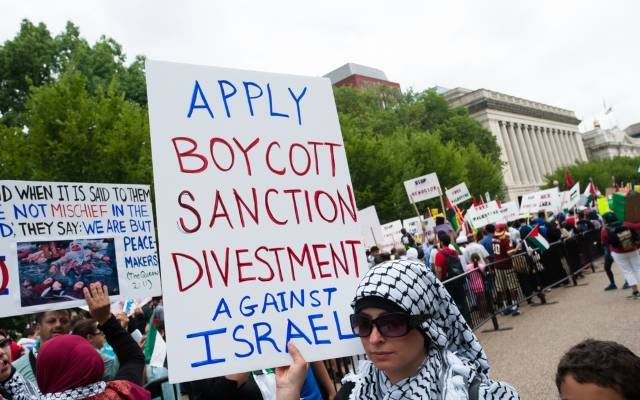A recent study found that one out of every six Israeli academics hides his or her national identity when submitting drafts of research papers in order to avoid falling victim to anti-Semitism fueled by the anti-Israel Boycott, Divestment and Sanctions (BDS) movement.
“These are the new hidden Jews, the new anusim (forced converts) within Israeli academia,” said International Freedom of Research Center (IFRC) Director Sharona Goldenberg, who presented the study’s findings at a Tel Aviv conference on anti-Semitism and the BDS movement. “By putting them into a situation where they need to hide their identity, the boycotters are breaching their basic rights.”
The IFRC study, conducted last month, surveyed 500 Israeli academics who live in Israel and abroad. Israeli academics, according to the study, sometimes use only part of their name or a different name when they first submit proposal drafts. At other times, scholars will not use Israeli subjects in survey samples or data related specifically to Israel.
Goldenberg decided to conduct the survey based on her own fear to be identified as an Israeli.
“I had done a study on work hours in Europe and asked a Jewish colleague from overseas if he would have a look at it,” said Goldenberg. “The first thing he asked me was why I was only writing about Europe and not about Israel. I told him that I was afraid to be identified as Israeli, and that’s when I got the idea to do this study.”
In the United States, the Association for Asian American Studies and the American Studies Association (ASA) have approved proposals to boycott Israeli universities. The American Anthropological Association passed a similar boycott resolution and is awaiting a vote by its membership to approve or reject the measure.
Only Because They Are Israeli
As a global boycott movement against Israeli universities gains steam, Israeli professors say they are feeling the pressure from their colleagues overseas. Although the movement ostensibly targets universities, not individuals, Israeli academics say they are often shunned at the personal level. They experience snubs at academic conferences, struggle to get recommendations and can experience difficulty publishing their work in professional journals, only because they are Israeli.
The academic boycott is part of the broader pro-Palestinian and anti-Israel “BDS” campaign, which advocates boycotts, divestment and sanctions against Israel. Inspired by the anti-apartheid movement, BDS organizers say they are using nonviolent means to promote the Palestinian struggle for independence.
However, the scope of their activities exceeds that, and their ultimate objective appears to be the complete destruction of the Jewish State. Israel says the campaign goes beyond fighting its presence in Judea and Samaria and Jerusalem, and often masks a more far-reaching aim to “delegitimize” or destroy the Jewish state.
The BDS website claims “the vast majority of Israeli intellectuals and academics have either contributed directly to the Israeli occupation and apartheid or at the very least have been complicit through their silence.”
And yet Israeli universities are widely seen as liberal and often left-leaning bastions, and their professors are some of the most vocal government critics, to no avail.
By: JNS.org and United with Israel Staff

Do You Love Israel? Make a Donation - Show Your Support!
Donate to vital charities that help protect Israeli citizens and inspire millions around the world to support Israel too!
Now more than ever, Israel needs your help to fight and win the war -- including on the battlefield of public opinion.
Antisemitism, anti-Israel bias and boycotts are out of control. Israel's enemies are inciting terror and violence against innocent Israelis and Jews around the world. Help us fight back!
See our Privacy Policy

